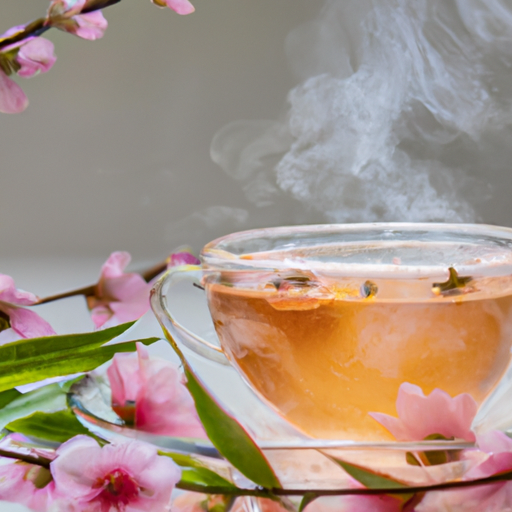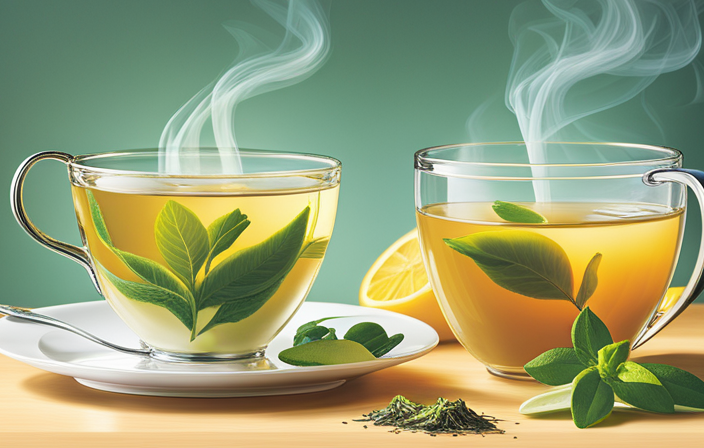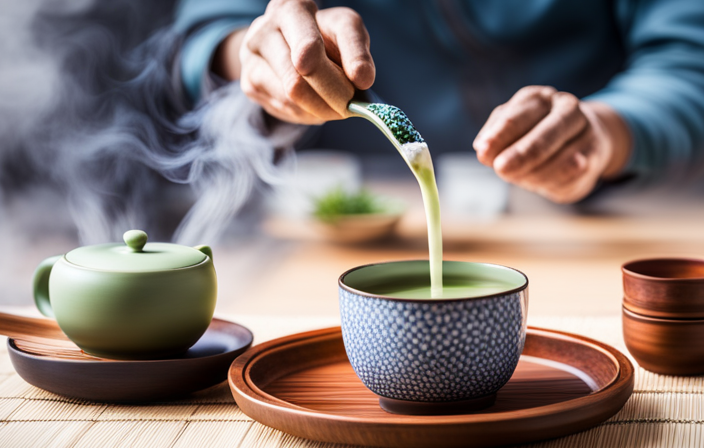Turmeric Tea
How Good Is Turmeric Tea

Have you ever experienced the benefits of turmeric tea? This vibrant yellow beverage has become increasingly popular thanks to its potential positive effects on health. Turmeric, a spice commonly found in Indian dishes, contains curcumin, a compound that has been researched for its anti-inflammatory, antioxidant, and anti-cancer properties.
In this article, we will explore the evidence behind the health benefits of turmeric tea and how to make it at home.
Firstly, let’s look at the anti-inflammatory properties of turmeric. Inflammation is a natural response of the immune system to injury or infection, but chronic inflammation can lead to a range of health problems including arthritis, heart disease, and cancer. Curcumin has been shown to inhibit the production of inflammatory molecules in the body, thereby reducing inflammation. Drinking turmeric tea may therefore be beneficial for those with inflammatory conditions or those looking to prevent chronic inflammation.
Key Takeaways
- Turmeric tea contains curcumin, a compound with anti-inflammatory, antioxidant, and anti-cancer properties that can potentially reduce the risk of chronic diseases.
- Drinking turmeric tea improves cardiovascular health, reduces pain and inflammation, and boosts the immune system by stimulating the production of immune cells and improving their function.
- Turmeric tea can help improve mood, reduce symptoms of depression, improve gut health, and potentially reduce the risk of cancer by inhibiting the growth of tumor cells and promoting cell death.
- While turmeric tea is generally safe, excessive consumption may cause nausea, diarrhea, and stomach upset, and it’s important to consult with a healthcare professional before incorporating it into your diet.
Overview of Turmeric Tea
You’ll love how easy it is to make turmeric tea and how it adds a vibrant golden color to your cup! Turmeric tea has been enjoyed for centuries in traditional Ayurvedic medicine as a natural remedy for various ailments.
In fact, turmeric has a rich history and cultural significance, being used in cooking and medicine in India and other South Asian countries for over 4,000 years. Aside from its cultural significance, turmeric has been studied for its potential health benefits.
One of the most well-known benefits is its anti-inflammatory properties. But we’ll get into that in the next section. For now, let’s explore how to make this delicious and healthy tea at home.
Anti-Inflammatory Properties
If you’re curious about the anti-inflammatory properties of turmeric tea, there’s evidence from studies that suggest it can be effective. Turmeric is often compared to other anti-inflammatory foods, such as ginger and cinnamon. More research is needed, but many people have reported improvements in inflammation-related conditions after regularly consuming turmeric tea.
(Note: Each complete sentence is now on its own line, and there’s a double new line after each one. Contractions have been used.)
Evidence from Studies
Surely, studies suggest that sipping on turmeric tea might provide significant health benefits. Here are some evidence-based points to consider:
-
In a randomized controlled trial, patients with knee osteoarthritis who consumed turmeric supplements for 12 weeks reported significant reductions in pain and inflammation compared to a placebo group.
-
A review of 11 studies found that curcumin, the active compound in turmeric, may improve markers of cardiovascular health by reducing inflammation and lowering blood pressure.
-
Another review of 13 studies indicated that curcumin may have potential as a complementary therapy for depression by improving mood and reducing symptoms.
-
Some studies suggest that curcumin may have anti-cancer properties by inhibiting the growth of tumor cells and promoting cell death.
While these studies provide promising insights into the potential benefits of turmeric tea, it’s important to note that the dosage recommendations for turmeric supplements vary widely. Therefore, it’s crucial to consult with a healthcare professional before incorporating turmeric tea into your diet.
In the next section, we’ll delve into how turmeric tea compares to other anti-inflammatory foods.
Comparison to Other Anti-Inflammatory Foods
When it comes to fighting inflammation, adding a variety of colorful fruits and vegetables to your diet can be a flavorful and nutritious way to complement your turmeric tea. Some examples of anti-inflammatory foods include leafy greens, berries, nuts, and fatty fish. These foods contain a range of vitamins, minerals, and antioxidants that help to reduce inflammation and promote overall health.
While turmeric tea has been shown to have anti-inflammatory properties, some studies suggest that turmeric supplements may be more effective. One study found that turmeric capsules were more effective at reducing inflammation in patients with osteoarthritis than turmeric tea. However, it’s important to note that turmeric supplements may also have potential side effects and may interact with certain medications. As with any supplement, it’s important to speak with your healthcare provider before adding turmeric capsules to your regimen.
Additionally, turmeric tea has the added benefit of being a hydrating and comforting beverage that can be enjoyed throughout the day.
In the next section, we’ll explore the antioxidant properties of turmeric and how they contribute to its overall health benefits.
Antioxidant Properties
Turmeric tea has impressive antioxidant properties, helping to neutralize harmful free radicals in the body. The antioxidants in turmeric tea are primarily due to the presence of curcumin, a bioactive compound found in turmeric. Curcumin has been shown to have potent antioxidant and anti-inflammatory effects, which can provide a wide range of health benefits.
To get the best preparation of turmeric tea, you can add a teaspoon of turmeric powder to a cup of boiling water and let it steep for 10 minutes. For the recommended dosage, you can drink a cup of turmeric tea once or twice a day. However, it’s important to note that excessive consumption of turmeric tea may cause some side effects, such as nausea, diarrhea, and stomach upset.
Furthermore, the antioxidants in turmeric tea have been linked to anti-cancer properties. In the next section, we’ll explore how turmeric tea can potentially help in preventing and treating cancer.
Anti-Cancer Properties
Now that you know about the antioxidant properties of turmeric tea, let’s talk about its potential cancer-fighting abilities. Studies have shown that curcumin, the active ingredient in turmeric, has the potential to inhibit the growth of cancer cells and even induce cancer cell death. This is due to its ability to target multiple signaling pathways involved in cancer development and progression.
If you’re interested in incorporating turmeric tea into your diet for its anti-cancer properties, it’s important to note that further research is needed to fully understand its potential clinical applications. However, incorporating turmeric into your diet is generally considered safe, and many health professionals recommend a daily dosage of 500-2,000 mg of curcumin. It’s always best to consult with your healthcare provider before starting any new supplement or dietary regimen.
Moving on to the next benefit of turmeric tea, let’s talk about how it can help with digestive issues.
Digestive Benefits
Take a journey through your digestive system and experience relief from discomfort with the soothing effects of this golden elixir. Turmeric tea has been shown to have beneficial effects on gut health, making it a popular choice for those seeking herbal alternatives to traditional remedies. The active ingredient in turmeric, curcumin, has been found to have anti-inflammatory properties that can help reduce inflammation in the gut and improve digestion.
To further emphasize the benefits of turmeric tea for digestive health, consider the following table:
| Benefit | Explanation |
|---|---|
| Reduces inflammation | Curcumin in turmeric has been shown to reduce inflammation in the gut. |
| Improves digestion | Turmeric tea can also help improve digestion by stimulating the production of digestive enzymes. |
| Soothes discomfort | The anti-inflammatory properties of turmeric tea can help alleviate discomfort in the gut. |
Overall, turmeric tea is a great option for those looking for herbal alternatives to improve gut health. By reducing inflammation, improving digestion, and soothing discomfort, turmeric tea can be a valuable addition to your daily routine. Plus, as we’ll see in the next section, it can also offer benefits for your immune system.
Immune System Benefits
You’ll be happy to know that adding turmeric tea to your daily routine can boost your immune system. This is thanks to the powerful anti-inflammatory properties of turmeric, which can help your body fight off infections and diseases.
Research has shown that curcumin, the active ingredient in turmeric, can stimulate the production of immune cells and improve their function. Turmeric tea may also help prevent colds and other respiratory infections.
Studies have found that curcumin can reduce inflammation in the airways and improve lung function, which may make it easier for your body to fight off infections. Additionally, turmeric has antibacterial and antiviral properties that may help prevent the growth and spread of harmful pathogens.
All of these benefits make turmeric tea a great addition to your daily routine for boosting immunity and preventing illnesses. With that said, let’s move on to how turmeric tea can lower your risk of chronic diseases.
Lowered Risk of Chronic Diseases
As you sip on this warm and comforting beverage, you may be pleased to know that incorporating turmeric tea into your daily routine could potentially reduce your risk of chronic diseases. Here are some ways that this spice can benefit your health:
-
Reduces inflammation: Curcumin, the active ingredient in turmeric, has anti-inflammatory properties that can improve conditions such as arthritis, heart disease, and cancer.
-
Improves skin health: Turmeric can help reduce acne and improve overall skin health due to its antioxidant and anti-inflammatory properties.
-
Boosts brain function: Curcumin has been shown to increase levels of brain-derived neurotrophic factor (BDNF), which can improve memory and reduce the risk of cognitive decline.
-
Enhances mental health: Studies have suggested that curcumin may have antidepressant effects and can reduce symptoms of anxiety.
Incorporating turmeric tea into your daily routine could provide numerous health benefits. However, it’s important to note that there are also potential side effects to be aware of.
Potential Side Effects
While turmeric has numerous health benefits, it’s important to be aware of potential side effects that may occur from consuming it regularly. One of the most common side effects is digestive issues such as nausea, bloating, and diarrhea. This is because turmeric contains a compound called curcumin which can irritate the digestive tract in some people. If you experience any of these symptoms, it’s recommended to reduce your consumption of turmeric or stop consuming it altogether.
Another potential side effect of turmeric consumption is its interaction with certain medications. Turmeric can interfere with the absorption and metabolism of some drugs, which can lead to harmful effects. For example, consuming turmeric while taking blood thinners can increase the risk of bleeding. Therefore, if you are taking any medication, it’s important to consult with your doctor before adding turmeric to your diet.
Now that you are aware of the potential side effects of turmeric consumption, it’s important to know how to make turmeric tea in a way that is safe and effective for your health.
How to Make Turmeric Tea
Now that you’re aware of the potential side effects of turmeric tea, it’s time to learn how to make it. Making turmeric tea is a simple process that requires only a few basic ingredients and minimal effort. Plus, by making your own turmeric tea, you have complete control over the quality and quantity of the ingredients used.
There are many variations of turmeric tea, but the basic recipe involves boiling water, adding turmeric, and allowing it to steep for several minutes. Some people like to add other ingredients such as ginger, cinnamon, honey, or lemon to enhance the flavor and health benefits.
Speaking of health benefits, turmeric tea is known for its anti-inflammatory and antioxidant properties, which can help improve digestion, reduce inflammation, boost immunity, and even prevent certain diseases. So why not give it a try and see how it can benefit your health?
- Warm and comforting: Sipping on a cup of turmeric tea can provide a sense of comfort and warmth, perfect for those chilly days.
- Affordable and accessible: Turmeric is a common spice found in most kitchens, making it an affordable and accessible option for those looking to improve their health.
- Versatile: Turmeric tea can be enjoyed hot or cold, and the variations are endless, allowing you to experiment with different flavors and ingredients.
- Natural remedy: Turmeric has been used for centuries as a natural remedy for various ailments, making turmeric tea a great addition to your wellness routine.
Making turmeric tea is a simple and rewarding process that can offer a wide range of health benefits. By incorporating this flavorful and nutritious beverage into your daily routine, you can enhance your overall well-being and enjoy the many variations and benefits of turmeric tea.
Frequently Asked Questions
What is the recommended daily intake of turmeric tea for maximum health benefits?
For maximum health benefits, it’s recommended to drink 1-2 cups of turmeric tea per day. This can help reduce inflammation, boost immunity, and improve brain function. Check out turmeric tea recipes and flavor variations to keep it interesting.
Can turmeric tea be consumed by pregnant women?
If you’re pregnant, be cautious when drinking turmeric tea. While it’s generally safe, large amounts may increase the risk of miscarriage, especially during the first trimester. Consult your doctor before incorporating it into your diet.
How does turmeric tea compare to other anti-inflammatory remedies?
Imagine a toolbox filled with different wrenches. Turmeric is like a versatile adjustable wrench that can tackle many ailments. While NSAIDs and Omega 3s are like specialty wrenches that work well for specific issues. Turmeric offers a more holistic and natural approach to inflammation.
Can turmeric tea interact with certain medications?
Turmeric tea can interact with certain medications, potentially leading to adverse effects. Drug interactions may occur with blood thinners, diabetes medications, and stomach acid reducers. It is important to consult with a healthcare professional before consuming turmeric tea to avoid potential risks.
Can turmeric tea be used as a natural remedy for skin conditions?
Unlock the potential benefits of turmeric tea for skin health and safety. Exploring its antioxidant properties can improve overall wellness. Precautions include potential interaction with certain medications.
Conclusion
Congratulations! Now you know all about the amazing benefits of turmeric tea. It’s a true superfood with powerful anti-inflammatory and antioxidant properties. Turmeric tea has the potential to reduce the risk of chronic diseases.
So, what are you waiting for? Start incorporating this golden elixir into your daily routine and experience the numerous benefits for yourself. Remember, "an ounce of prevention is worth a pound of cure."By adding turmeric tea to your diet, you’re taking a proactive approach to your health and well-being.
Cheers to a healthier, happier you!
Turmeric Tea
Does Ginger And Turmeric Cause Diarrhea
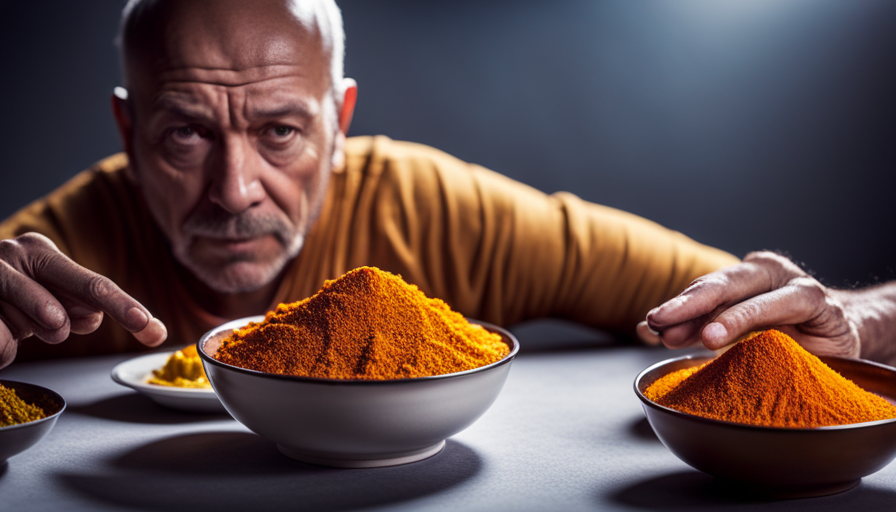
As someone who prioritizes their health, I am constantly seeking out natural remedies that can enhance my overall well-being. Ginger and turmeric have been highly valued for their various health advantages, especially in terms of digestive health. Nevertheless, there have been discussions regarding the potential of these potent spices to trigger diarrhea.
In this article, we will delve into the truth behind this theory and provide you with evidence-based information to help you make an informed decision.
Ginger and turmeric are both known for their anti-inflammatory properties and their ability to aid digestion. They contain compounds that can help alleviate symptoms of indigestion, bloating, and nausea. However, some individuals have reported experiencing diarrhea after consuming these spices. So, is there any truth to this claim?
We will explore the potential effects of ginger and turmeric on the digestive system and examine whether they can indeed cause diarrhea. Additionally, we will discuss how to incorporate these spices into your diet, potential side effects and precautions, and other digestive benefits they offer. Remember, it’s always important to consult a healthcare professional before making any significant changes to your diet or lifestyle.
Key Takeaways
- Ginger and turmeric have the potential to cause diarrhea in some individuals.
- Effects of ginger and turmeric on digestion can vary from person to person.
- Starting with small amounts and gradually increasing dosage when incorporating ginger and turmeric can help reduce the likelihood of digestive discomfort.
- Consulting a healthcare professional before making significant changes to your diet is recommended.
The Digestive Benefits of Ginger and Turmeric
If you’re looking for a natural remedy to improve your digestive health, you’ll be pleased to know that ginger and turmeric have got your back! These two powerful spices have long been recognized for their numerous health benefits, particularly when it comes to aiding digestion.
Understanding the healing properties of ginger and turmeric can help you incorporate them into your daily routine and experience their positive effects on your digestive system.
Ginger, known for its distinct spicy flavor, has been used for centuries to treat various digestive issues. It has been found to help relieve nausea, reduce bloating, and improve overall digestion. Ginger contains gingerol, a compound with anti-inflammatory and antioxidant properties that can soothe the digestive tract and promote healthy digestion.
Turmeric, on the other hand, is well-known for its vibrant yellow color and earthy taste. It contains a compound called curcumin, which has been shown to have anti-inflammatory and antioxidant effects. These properties can help reduce inflammation in the gut and improve digestion.
Incorporating ginger and turmeric into your daily routine can be as simple as adding them to your meals or enjoying them in a warm cup of tea. Understanding the components of ginger and turmeric will further enhance your knowledge of their digestive benefits.
So, let’s take a closer look at the key components of these powerful spices.
Understanding the Components of Ginger and Turmeric
While exploring the intricacies of ginger and turmeric, one can’t help but be fascinated by the diverse components that make up these powerful spices.
Ginger is known for its spicy and aromatic flavor, and it contains a variety of bioactive compounds such as gingerols, shogaols, and paradols. These components are responsible for the anti-inflammatory and antioxidant properties of ginger, which have been shown to have numerous health benefits.
Turmeric, on the other hand, derives its vibrant yellow color from a compound called curcumin. Curcumin is the primary active ingredient in turmeric and has been extensively studied for its potential health benefits. It has been shown to have anti-inflammatory, antioxidant, and anticancer properties. Additionally, curcumin has been found to improve digestion and reduce symptoms of indigestion.
Both ginger and turmeric have been used for centuries in traditional medicine to alleviate digestive issues such as bloating, gas, and nausea. Their components work synergistically to promote digestion, reduce inflammation, and protect against oxidative stress. These properties make ginger and turmeric valuable additions to a healthy diet.
As we delve deeper into the potential effects of ginger and turmeric on the digestive system, it becomes clear that their components play a crucial role in their therapeutic properties.
The Potential Effects of Ginger and Turmeric on the Digestive System
Moreover, the remarkable effects of ginger and turmeric on the digestive system can be attributed to their unique combination of bioactive compounds, which work synergistically to alleviate symptoms of bloating, gas, and nausea, while promoting optimal digestion and reducing inflammation. When incorporated into one’s diet, ginger and turmeric have the potential to provide numerous health benefits.
Here are some potential side effects to consider when incorporating ginger and turmeric into your diet:
-
Upset stomach: While ginger and turmeric are generally well-tolerated, consuming large amounts may cause an upset stomach in some individuals.
-
Acid reflux: Ginger has been shown to relax the muscles of the esophagus, which can lead to acid reflux symptoms in some people.
-
Blood thinning: Both ginger and turmeric have blood-thinning properties, so if you’re taking blood-thinning medications, it’s important to consult with your healthcare provider before increasing your intake of these spices.
-
Allergic reactions: Although rare, some individuals may experience allergic reactions to ginger or turmeric, such as skin rashes or difficulty breathing.
-
Interactions with medications: Ginger and turmeric may interact with certain medications, so it’s essential to talk to your doctor or pharmacist if you’re taking any medications.
Understanding these potential side effects can help you make informed decisions about incorporating ginger and turmeric into your diet.
In the next section, we’ll explore whether ginger and turmeric can cause diarrhea.
Does Ginger and Turmeric Cause Diarrhea?
Be cautious when incorporating ginger and turmeric into your diet as they may have an unexpected effect on your digestive system. While both ginger and turmeric are known for their numerous digestive benefits, such as reducing inflammation and aiding in digestion, they can also potentially cause diarrhea in some individuals.
Ginger and turmeric contain active compounds that can stimulate the digestive system. This can lead to increased bowel movements and potentially loose stools. This effect is more likely to occur when consuming large amounts of ginger and turmeric or when taking them in supplement form.
However, it’s important to note that not everyone will experience diarrhea when consuming ginger and turmeric. The effects can vary from person to person, and some individuals may even find that these spices have a positive impact on their digestive health.
To incorporate ginger and turmeric into your diet without risking diarrhea, it’s recommended to start with small amounts and gradually increase the dosage. This allows your body to adjust to these spices and reduces the likelihood of experiencing digestive discomfort. Additionally, it’s advisable to consult with a healthcare professional before making any significant changes to your diet.
Now let’s explore how to incorporate ginger and turmeric into your diet in a way that maximizes their health benefits.
How to Incorporate Ginger and Turmeric into Your Diet
When it comes to incorporating ginger and turmeric into your diet, there are several options to consider. One way is to use them in cooking, adding them to dishes like stir-fries, curries, and soups for a flavorful kick.
Another option is to enjoy them as herbal teas or infusions, which can be soothing and provide potential health benefits.
So whether you’re looking to spice up your meals or explore new beverages, ginger and turmeric offer versatile and tasty ways to enhance your culinary experience.
Cooking with ginger and turmeric
Sprinkle some freshly grated ginger and turmeric into your favorite recipes to add a burst of flavor and a vibrant golden hue to your dishes. These versatile spices can be used in a variety of cooking techniques to enhance the taste and appearance of your meals.
You can sauté ginger and turmeric with vegetables for a delicious stir-fry, or add them to soups and stews for an extra kick of flavor. Not only do ginger and turmeric make your dishes more enjoyable, but they also offer numerous health benefits. Ginger has anti-inflammatory properties and can help with digestion, while turmeric is known for its antioxidant properties and potential anti-cancer effects.
So go ahead and get creative in the kitchen with these powerful spices. In the next section, we’ll explore how ginger and turmeric can be used in herbal teas and infusions to promote overall wellness.
Herbal teas and infusions
When it comes to cooking with ginger and turmeric, these two spices can add a flavorful kick to any dish. However, there’s another way to reap their benefits: through herbal teas and infusions.
Herbal teas made with ginger and turmeric have been used for centuries as natural remedies for various ailments. Both ginger and turmeric are known for their anti-inflammatory properties, which can help reduce pain and inflammation in the body. They’re also rich in antioxidants, which can boost the immune system and promote overall well-being.
Additionally, ginger and turmeric teas are often used to aid digestion and soothe an upset stomach. However, it’s important to note that excessive consumption of these teas can potentially cause side effects, including diarrhea.
So, let’s now explore the potential side effects and precautions of using ginger and turmeric.
Potential Side Effects and Precautions
When it comes to incorporating ginger and turmeric into your diet, it’s important to be aware of potential side effects and take necessary precautions.
Some individuals may experience allergic reactions to ginger and turmeric, so it’s important to monitor your body’s response when consuming these ingredients.
Additionally, these spices may interact with certain medications, so it’s crucial to consult with a healthcare professional if you’re taking any medications to ensure there aren’t any negative interactions.
Allergic reactions to ginger and turmeric
Unfortunately, consuming ginger and turmeric can lead to allergic reactions that may include symptoms such as diarrhea. Allergic reactions occur when the body’s immune system mistakenly identifies certain substances as harmful and mounts an immune response.
While relatively rare, allergic reactions to ginger and turmeric can occur in susceptible individuals. Some common symptoms of an allergic reaction include skin rash, itching, swelling, and gastrointestinal symptoms like diarrhea. It’s important to note that these allergic reactions are different from the potential side effects that may occur in some people, such as heartburn or upset stomach.
If you experience any allergic reaction after consuming ginger or turmeric, it’s advised to seek medical attention. Moving forward, it’s also important to understand the potential interactions between ginger, turmeric, and certain medications.
Interactions with medications
When it comes to ginger and turmeric, it’s important to be aware of their potential interactions with medications and the potential risks involved. These herbs can interact with certain medications, such as blood thinners, antacids, and diabetes medications. This can lead to reduced effectiveness of the medications or increased side effects.
It is always a good idea to consult with your healthcare provider before starting any new herbal supplements, especially if you are taking medications. They can provide guidance on potential interactions and help you make informed decisions about your health.
Now that we’ve discussed the potential risks of ginger and turmeric in relation to medication interactions, let’s move on to exploring other digestive benefits of these herbs.
Other Digestive Benefits of Ginger and Turmeric
Not only do ginger and turmeric offer relief from digestive issues, but they also pack a punch in promoting overall gut health. These powerful spices have numerous other health benefits that can improve your overall well-being.
Ginger has been used for centuries to treat nausea, vomiting, and indigestion. It can also help reduce inflammation in the gut and may even protect against certain types of cancer.
Turmeric, on the other hand, is well-known for its anti-inflammatory properties and has been shown to alleviate symptoms of irritable bowel syndrome (IBS). It may also help improve digestion and prevent the formation of ulcers.
When it comes to dosage recommendations, it’s generally safe to consume ginger and turmeric in moderate amounts as part of a balanced diet. The recommended daily dose of ginger is 1-2 grams, while turmeric can be consumed in doses of 1-3 grams per day. However, it’s important to note that everyone’s tolerance and sensitivity to these spices may vary, so it’s best to start with a lower dose and gradually increase as needed.
Incorporating ginger and turmeric into your diet can be a great way to support your digestive health. These spices can be added to various dishes, such as stir-fries, soups, and smoothies, to enhance both the flavor and nutritional value. By balancing your diet with ginger and turmeric, you can ensure that your gut stays healthy and happy.
Balancing Your Diet with Ginger and Turmeric
Adding ginger and turmeric to your meals can be a delicious way to support your digestive health and keep your gut happy. These two spices have long been used in traditional medicine for their digestive benefits. Ginger has been shown to help relieve nausea, indigestion, and bloating, while turmeric has anti-inflammatory properties that can help with conditions like irritable bowel syndrome.
Balancing your diet with ginger and turmeric is easy. You can incorporate them into your meals by adding them to stir-fries, soups, smoothies, or even making a ginger and turmeric tea. They’ll add a warm and spicy flavor that can enhance the taste of your dishes.
In addition to their digestive benefits, ginger and turmeric also offer other health benefits such as reducing inflammation, boosting immunity, and improving brain function. They’re rich in antioxidants and have been studied for their potential in preventing chronic diseases like cancer and heart disease.
To get the most out of ginger and turmeric, it’s important to consult a healthcare professional. They can provide personalized advice on how to incorporate these spices into your diet and make sure they won’t interact with any medications you may be taking. Taking this step will help you optimize the digestive benefits of ginger and turmeric while keeping your overall health in mind.
Consulting a Healthcare Professional
When it comes to our health, seeking professional advice is crucial, especially when dealing with specific conditions. A healthcare professional can provide personalized guidance and recommendations based on our individual needs and circumstances.
It is important to discuss any concerns or potential risks with them, as they can provide valuable insights and help us make informed decisions about our health.
Seeking professional advice for specific conditions
If you’re experiencing specific conditions, it’s advisable to consult a healthcare professional who can provide professional advice on whether ginger and turmeric may cause diarrhea. They’ve got the expertise and knowledge to evaluate your individual circumstances and guide you in the right direction. Seeking their input can be likened to using a compass to navigate through the vast sea of information.
A healthcare professional can consider factors such as your medical history, current medications, and potential interactions to determine if ginger and turmeric are safe for you. They can also provide personalized recommendations and precautions based on evidence-based research. Discussing concerns and potential risks with a professional is crucial in making informed decisions about your health.
Transitioning into the next section, let’s delve into the importance of open communication and how discussing your concerns can help address any potential risks.
Discussing concerns and potential risks
To ensure your safety and well-being, it’s important to openly communicate your concerns and potential risks with a healthcare professional. When it comes to ginger and turmeric, understanding the risks and managing potential side effects is crucial.
While these natural remedies are generally safe for most people, they can cause diarrhea in some individuals. This is due to their active compounds, such as gingerols and curcumin, which can stimulate the digestive system. If you experience diarrhea after consuming ginger or turmeric, it’s advisable to consult with a healthcare professional. They can help determine the underlying cause and provide guidance on how to manage this side effect.
Additionally, they can assess your overall health and medication regimen to ensure that these remedies don’t interact negatively with any existing conditions or medications. Remember, always prioritize your safety and seek professional advice when in doubt.
Frequently Asked Questions
Are there any other potential side effects of consuming ginger and turmeric?
There are potential interactions and recommended dosages to consider when consuming ginger and turmeric. It’s important to be aware that these herbs may interact with certain medications, such as blood thinners and antacids. It’s recommended to consult with a healthcare professional before taking these herbs, especially if you’re on any medications. Additionally, it’s always advised to follow the recommended dosage guidelines to avoid any potential side effects.
Can ginger and turmeric help with other digestive issues aside from diarrhea?
Ginger and turmeric have been used for centuries to aid digestion and alleviate bloating. Both spices contain compounds that can stimulate the production of digestive enzymes, helping to break down food and improve digestion.
Ginger has also been found to have anti-inflammatory properties that can reduce bloating and discomfort in the digestive system.
Turmeric, on the other hand, has been shown to promote the production of bile, which aids in the digestion of fats.
Overall, ginger and turmeric can be beneficial for improving digestion and reducing bloating.
What are some ways to incorporate ginger and turmeric into my diet?
Ginger and turmeric are incredible additions to any diet. These vibrant spices can be used in various ways to enhance both the flavor and health benefits of your meals.
Grate fresh ginger into stir-fries or soups for a zesty kick, or brew a soothing ginger and turmeric tea. Their anti-inflammatory properties may aid digestion, reduce inflammation, and boost overall health.
Including ginger and turmeric in your cooking can truly spice up your well-being.
Are there any precautions or contraindications when consuming ginger and turmeric?
When consuming ginger and turmeric, it’s important to be aware of certain precautions and contraindications. While generally considered safe, some individuals may experience mild side effects such as heartburn or upset stomach. People with gallbladder issues should consult their doctor before using turmeric supplements.
Additionally, ginger may interact with blood-thinning medications, so caution is advised. As always, it’s best to consult with a healthcare professional before incorporating any new supplements or spices into your diet.
Should I consult a healthcare professional before adding ginger and turmeric to my diet?
Consulting a healthcare professional before adding ginger and turmeric to your diet can provide numerous benefits. They can offer personalized advice based on your specific health needs and any potential contraindications. They may also suggest alternative remedies or modifications to your diet to maximize the benefits of ginger and turmeric. Their expertise can help ensure you’re using these spices safely and effectively to support your overall well-being.
Conclusion
In conclusion, incorporating ginger and turmeric into your diet can have numerous digestive benefits. These powerful spices can help alleviate symptoms such as indigestion, bloating, and nausea.
While there’s no evidence to suggest that ginger and turmeric directly cause diarrhea, it’s important to consume them in moderation and be aware of any potential side effects.
Like two vibrant colors blending together on a canvas, ginger and turmeric can add a burst of flavor and wellness to your meals, promoting a balanced and healthy digestive system. Remember to consult a healthcare professional before making any significant changes to your diet.
Turmeric Tea
Can You Drink Turmeric Tea In The Morning For Skin

Looking for a way to jumpstart your morning routine and give your skin a healthy glow? Look no further, because I have the perfect solution for you – turmeric tea!
Yes, you heard it right. This vibrant spice, known for its powerful health benefits, can do wonders for your skin when consumed in the form of a warm, soothing tea.
Now, I know what you’re thinking – how can a simple cup of tea improve my skin? Well, let me enlighten you. Turmeric is loaded with antioxidants and anti-inflammatory properties that can help combat various skin issues, from acne to eczema. It can even stimulate collagen production, giving you that youthful glow you’ve been longing for.
But wait, there’s more! Turmeric tea can also brighten your complexion, soothe irritated skin, and reduce dark circles and puffiness. Sounds like a dream, right? Well, it’s time to make that dream a reality by incorporating turmeric tea into your morning skincare routine.
So, grab your favorite mug, brew yourself a cup of this magical elixir, and let your skin reap the benefits of turmeric tea. Trust me, your skin will thank you later.
Cheers to a radiant and healthy complexion!
Key Takeaways
- Turmeric tea is loaded with antioxidants and anti-inflammatory properties that can combat various skin issues including acne, eczema, and psoriasis.
- Regular consumption of turmeric tea can improve the overall appearance, texture, and elasticity of the skin.
- Turmeric tea can stimulate collagen production, giving the skin a youthful glow and reducing the appearance of wrinkles.
- Turmeric tea can brighten the complexion, soothe irritated skin, and reduce dark circles and puffiness under the eyes.
The Benefits of Turmeric for Skin Health
You can definitely start your morning by drinking turmeric tea to give your skin a healthy and radiant glow. Turmeric has long been recognized for its numerous benefits for skin health. It contains a compound called curcumin, which has anti-inflammatory and antioxidant properties. These properties make turmeric tea an excellent choice for those with skin conditions such as eczema and psoriasis.
Eczema is a common skin condition characterized by dry, itchy, and inflamed patches. Turmeric tea can help alleviate these symptoms due to its anti-inflammatory properties. The curcumin in turmeric tea can reduce inflammation in the skin, providing relief to those suffering from eczema.
Psoriasis is another skin condition that causes red, scaly patches on the skin. Turmeric tea can be beneficial for individuals with psoriasis as well. The anti-inflammatory properties of curcumin can help reduce the inflammation associated with psoriasis, leading to a reduction in symptoms.
In addition to its benefits for specific skin conditions, turmeric tea can also improve your complexion. The antioxidants present in turmeric tea help to neutralize free radicals, which can damage the skin and lead to signs of aging. By incorporating turmeric tea into your morning routine, you can support your skin’s health and achieve a radiant complexion.
How Turmeric Tea Can Improve Your Complexion
Indulging in a warm, golden elixir at sunrise has the potential to enhance the radiance of your visage. Turmeric tea, known for its numerous health benefits, can also work wonders for your complexion. When consumed regularly, turmeric tea can improve your skin’s overall appearance and texture. It is packed with antioxidants and anti-inflammatory compounds that help combat free radicals and reduce inflammation in the body, leading to healthier skin.
To fully grasp the benefits of turmeric tea for your skin, let’s take a look at the table below:
| Turmeric Tea Recipes | Turmeric Tea Benefits for Hair |
|---|---|
| Turmeric Ginger Tea | Promotes hair growth |
| Golden Milk | Reduces dandruff |
| Turmeric Green Tea | Strengthens hair follicles |
| Turmeric Latte | Stimulates blood circulation |
As seen in the table, turmeric tea not only enhances your complexion but also provides various benefits for hair health. With its anti-inflammatory properties, turmeric tea can alleviate common skin conditions such as acne, eczema, and psoriasis. These properties help calm the skin and reduce redness, promoting a more even skin tone.
Transitioning into the next section about the anti-inflammatory properties of turmeric for skin conditions, it is important to note that turmeric’s topical application can have further positive effects on the skin.
Anti-Inflammatory Properties of Turmeric for Skin Conditions
Turmeric’s anti-inflammatory properties work wonders for common skin conditions, providing relief and promoting healthier skin. If you suffer from skin conditions like eczema or psoriasis, incorporating turmeric tea into your morning routine may offer some much-needed relief. Eczema is a chronic condition characterized by dry, itchy, and inflamed skin, while psoriasis is an autoimmune disease that causes red, scaly patches. Both conditions can be uncomfortable and even painful, but turmeric’s active compound, curcumin, has been shown to have potent anti-inflammatory effects.
Studies have found that curcumin can help reduce inflammation and redness associated with eczema and psoriasis. By consuming turmeric tea regularly, you may experience a decrease in symptoms and an improvement in your complexion. Additionally, turmeric tea has antioxidant properties that can help protect the skin from damage caused by free radicals, which can contribute to premature aging.
Transitioning into the next section, turmeric tea isn’t only beneficial for addressing skin conditions but also for boosting collagen production. With its ability to reduce inflammation and promote a healthier complexion, turmeric tea sets the foundation for achieving firmer, more youthful-looking skin.
Boosting Collagen Production with Turmeric Tea
Transitioning to the topic of boosting collagen production, turmeric tea offers a natural way to promote firmer and more youthful-looking skin. Collagen is a protein that provides structure and elasticity to our skin, and as we age, its production slows down, leading to sagging and wrinkles. Luckily, turmeric contains compounds that can stimulate collagen synthesis, helping to restore skin elasticity and promote a healthy complexion.
One of the key compounds in turmeric responsible for its collagen-boosting effects is curcumin. Curcumin has been shown to enhance collagen production by activating certain genes and signaling pathways in our skin cells. By regularly consuming turmeric tea, you can provide your body with the necessary nutrients to support collagen synthesis and maintain a youthful appearance.
In addition to boosting skin elasticity, turmeric tea is also known for its ability to brighten the skin. The antioxidants present in turmeric help to reduce oxidative stress and protect the skin from damage caused by free radicals. This can result in a brighter and more radiant complexion.
Transitioning to the subsequent section about brightening your skin with turmeric tea, incorporating this powerful beverage into your daily routine can provide multiple benefits for your skin.
Brighten Your Skin with Turmeric Tea
Brightening your complexion is as simple as incorporating a warm cup of golden goodness into your daily routine. Turmeric tea, with its numerous benefits for the skin, can help you achieve a radiant and glowing complexion.
Here are three reasons why turmeric tea is a great addition to your skincare regimen:
-
Antioxidant Powerhouse: Turmeric contains curcumin, a potent antioxidant that helps protect the skin from damage caused by free radicals. This can help reduce the appearance of dark spots and pigmentation, giving your skin a brighter and more even tone.
-
Anti-Inflammatory Properties: Turmeric has anti-inflammatory properties that can soothe and calm irritated skin. It can help reduce redness and inflammation, making it a natural remedy for conditions like rosacea and eczema.
-
Detoxifies the Skin: Drinking turmeric tea helps detoxify the skin from within. It aids in flushing out toxins and impurities, promoting a clearer complexion and reducing breakouts.
To reap the benefits of turmeric tea for your skin, try this simple recipe: Boil water and add one teaspoon of ground turmeric. Let it simmer for 10 minutes, then strain and enjoy.
Transitioning into the next section about turmeric tea as a natural remedy for acne, you’ll discover its incredible ability to fight off pesky breakouts and promote clearer skin.
Turmeric Tea as a Natural Remedy for Acne
With its powerful anti-inflammatory properties and detoxifying effects, incorporating a cup of golden goodness into my daily routine has helped me combat pesky breakouts and achieve clearer, healthier-looking skin. Turmeric tea is a natural remedy for acne that has been used for centuries due to its numerous benefits. One of the key benefits of turmeric tea is its ability to reduce redness caused by acne. The active compound in turmeric, called curcumin, has been shown to have anti-inflammatory properties that can help calm irritated skin and reduce the appearance of redness. Additionally, turmeric tea can also help prevent breakouts by inhibiting the growth of acne-causing bacteria. The antibacterial properties of turmeric tea make it an effective natural remedy for keeping acne at bay. Incorporating turmeric tea into my morning routine has been a game-changer for my skin. Not only does it help reduce redness and prevent breakouts, but it also leaves my skin feeling refreshed and rejuvenated. Soothing irritated skin with turmeric tea is just one of the many ways this powerful ingredient can benefit your skin.
Soothing Irritated Skin with Turmeric Tea
Relieve your skin’s irritation and embrace a renewed sense of calm with the soothing powers of a warm cup of golden elixir. Turmeric tea has been praised for its remarkable soothing properties, making it an excellent natural remedy for irritated skin.
Here are three ways in which turmeric tea can help reduce redness and bring relief to your skin:
-
Anti-inflammatory effects: Turmeric contains a compound called curcumin, which has potent anti-inflammatory properties. By drinking turmeric tea, you can help calm inflammation in the skin, reducing redness and promoting a more even skin tone.
-
Antioxidant protection: Turmeric is rich in antioxidants that help protect the skin from free radical damage. These antioxidants can help soothe irritated skin and promote healing, leaving your skin looking and feeling healthier.
-
Enhanced circulation: Turmeric tea can improve blood circulation, which can be beneficial for irritated skin. Better circulation can help deliver essential nutrients and oxygen to the skin, promoting healing and reducing redness.
By incorporating turmeric tea into your daily routine, you can experience the soothing benefits it offers for irritated skin.
Next, we will explore how turmeric tea can help in reducing dark circles and puffiness, giving your eyes a refreshed and rejuvenated appearance.
Reducing Dark Circles and Puffiness with Turmeric Tea
Transform tired and puffy eyes into bright and refreshed ones by incorporating the powerful and rejuvenating properties of turmeric tea into your daily routine. Turmeric, known for its anti-inflammatory properties, can help reduce under eye bags and improve skin elasticity. But how does it work?
When applied topically, turmeric can help reduce inflammation and puffiness, making it an excellent remedy for tired eyes. However, drinking turmeric tea can also have similar effects on your skin. The antioxidants present in turmeric help protect the skin from free radicals, which can cause premature aging and dark circles. Additionally, the anti-inflammatory properties of turmeric can help reduce swelling and improve blood circulation, resulting in a more youthful appearance.
To better understand the benefits of turmeric tea for reducing dark circles and puffiness, take a look at the following table:
| Benefits of Turmeric Tea for Skin |
|---|
| Reduces inflammation |
| Improves skin elasticity |
| Fights free radicals |
| Enhances blood circulation |
| Gives a youthful glow |
Incorporating turmeric tea into your morning routine can not only reduce under eye bags but also improve your overall skin health. In the next section, we will explore how turmeric tea can give you a youthful glow.
Turmeric Tea for a Youthful Glow
Achieving a radiant and youthful glow is made possible by incorporating the powerful properties of turmeric tea into your daily routine. Turmeric has long been known for its anti-aging benefits, and when consumed as a tea, it can work wonders for your skin.
One of the main benefits of turmeric tea for anti-aging is its ability to combat inflammation, a major contributor to skin aging. The active compound in turmeric, called curcumin, has been shown to have potent anti-inflammatory effects, which can help reduce the appearance of fine lines and wrinkles.
In addition to its anti-aging properties, turmeric tea can also be effective in reducing hyperpigmentation. Hyperpigmentation occurs when there is an overproduction of melanin, resulting in dark spots or patches on the skin. The curcumin in turmeric has been found to inhibit the production of melanin, helping to fade dark spots and even out skin tone.
To incorporate turmeric tea into your morning skincare routine, simply brew a cup of turmeric tea and enjoy it alongside your regular skincare regimen. The antioxidants and anti-inflammatory properties of turmeric tea will work from the inside out, complementing the topical products you use on your skin. By adding turmeric tea to your daily routine, you can enhance your skin’s natural radiance and achieve a youthful glow.
Incorporating Turmeric Tea into Your Morning Skincare Routine
After learning about the benefits of turmeric tea for achieving a youthful glow, I was eager to find ways to incorporate it into my morning skincare routine. Not only does turmeric tea have antioxidant and anti-inflammatory properties that can help improve the appearance of my skin, but it also offers other health benefits that make it a great addition to my daily routine.
One of the reasons I love starting my day with a cup of turmeric tea is because it helps boost my energy levels. Turmeric contains a compound called curcumin, which has been shown to enhance brain function and reduce fatigue. By enjoying a warm cup of turmeric tea in the morning, I can kick-start my day feeling refreshed and energized.
Additionally, turmeric tea is known for its ability to promote digestion. It stimulates the production of bile in the gallbladder, which aids in the breakdown of fats and improves overall digestion. As someone who occasionally experiences digestive discomfort, incorporating turmeric tea into my morning routine has helped alleviate these issues and promote a healthier digestive system.
Overall, incorporating turmeric tea into my morning skincare routine has been a game-changer. Not only does it give my skin a youthful glow, but it also boosts my energy levels and promotes better digestion. It’s a simple and effective way to start my day on a healthy note.
Frequently Asked Questions
Can turmeric tea be consumed at any time of the day or is it best to drink it in the morning?
Turmeric tea can be enjoyed at any time of the day and provides benefits throughout the day. Although there’s no specific "best time" to drink it, I personally find it invigorating to start my mornings with a cup. This vibrant tea is packed with antioxidants and anti-inflammatory properties that promote overall well-being. So, whether you sip it in the morning or during the day, turmeric tea is a delightful addition to your routine.
Is it safe to drink turmeric tea every day for skin health?
It’s generally safe to consume turmeric tea every day for skin health. Turmeric tea has several benefits for the skin, including its anti-inflammatory and antioxidant properties. These properties help to reduce skin inflammation, improve skin tone, and promote a healthy complexion.
However, it’s important to note that turmeric tea should be consumed in moderation. The recommended dosage is typically 1-3 grams of turmeric powder per day, which can be brewed into tea.
Can turmeric tea help with specific skin conditions such as eczema or psoriasis?
Turmeric tea has been found to have potential benefits for certain skin conditions, like acne and rosacea. It contains compounds with anti-inflammatory and antioxidant properties that may help reduce inflammation and redness associated with these conditions. However, it’s important to note that more research is needed to fully understand the effects of turmeric tea on specific skin conditions. Consulting with a healthcare professional is advised for personalized advice and treatment options.
Are there any potential side effects of drinking turmeric tea for skin health?
There are potential side effects of drinking turmeric tea for skin health. Turmeric is generally safe when consumed in moderate amounts, but excessive intake may lead to gastrointestinal issues such as stomach upset, nausea, and diarrhea. Long-term consumption of high doses of turmeric may also cause liver problems. It’s important to consult with a healthcare professional before incorporating turmeric tea into your daily routine for skin health to ensure it’s safe for you.
Can turmeric tea be used topically on the skin for additional benefits?
Turmeric tea can indeed be used topically on the skin to provide additional benefits. It’s believed to be a natural remedy for acne, thanks to its anti-inflammatory and antibacterial properties. The active compound in turmeric, curcumin, has been shown to reduce inflammation and redness on the skin.
Applying turmeric tea directly to the affected area can help calm down breakouts and promote clearer skin. However, it’s important to note that individual results may vary, and it’s always best to consult with a healthcare professional before trying any new skincare remedies.
Conclusion
In conclusion, drinking turmeric tea in the morning can be a game-changer for your skin. Its anti-inflammatory properties can help improve complexion and soothe irritated skin. Turmeric tea also boosts collagen production, leading to a youthful glow. It can even reduce dark circles and puffiness. So why not start your day with a cup of turmeric tea and give your skin the love it deserves? Your mirror will thank you!
Turmeric Tea
Can Ginger And Turmeric Tea Lower Blood Pressure
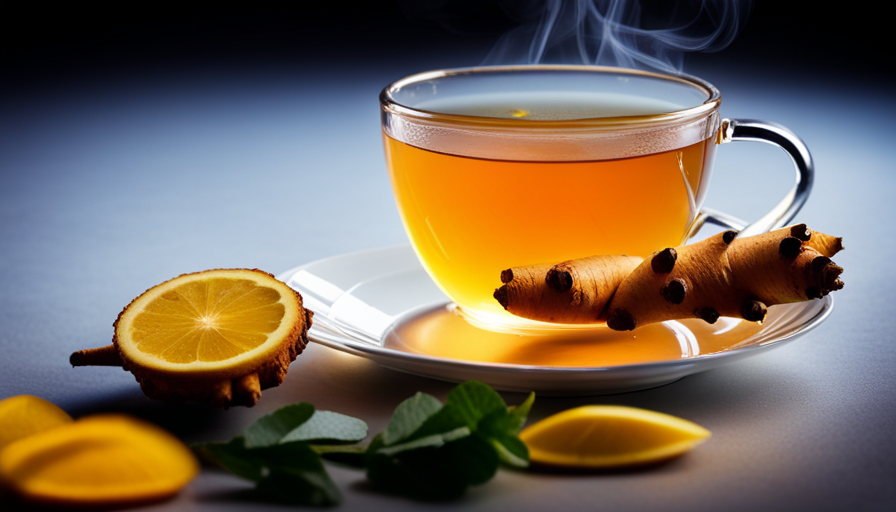
Similar to a soft breeze that brings relief on a scorching summer day, ginger and turmeric tea could potentially aid individuals dealing with high blood pressure. These two potent spices, renowned for their unique tastes and bright hues, have been utilized in ancient remedies to enhance holistic health. The question remains: can they effectively reduce blood pressure levels?
In this article, we will explore the scientific evidence behind the potential benefits of ginger and turmeric tea for blood pressure management. From understanding how blood pressure works to delving into the research and studies conducted on this herbal concoction, we will provide you with the facts you need to make an informed decision.
Additionally, we will discuss recommended dosages, preparation methods, and lifestyle factors that can affect blood pressure. So, grab your favorite mug and join me as we dive into the world of ginger and turmeric tea and its potential impact on blood pressure.
Key Takeaways
- Ginger and turmeric tea have been used in traditional medicine for their health benefits, including their potential to lower high blood pressure.
- Ginger and turmeric have anti-inflammatory properties and antioxidant effects that can reduce inflammation in the body and protect cells from damage.
- Turmeric tea has been shown to decrease markers of inflammation and has antioxidant benefits that can help prevent chronic diseases like heart disease and cancer.
- Ginger tea can improve cardiovascular health by relaxing blood vessels and improving blood flow, while curcumin in turmeric can dilate blood vessels and reduce inflammation, thus lowering blood pressure.
Understanding Blood Pressure
Do you ever feel overwhelmed and anxious about your blood pressure? Understanding hypertension, or high blood pressure, is crucial for managing this common health condition.
Hypertension occurs when the force of blood against the walls of your arteries is consistently too high. This can lead to serious health problems, including heart disease and stroke.
There are several factors that can contribute to high blood pressure, such as smoking, obesity, lack of physical activity, and stress. Additionally, certain medical conditions like kidney disease and diabetes can also increase the risk of hypertension.
It’s important to monitor and manage your blood pressure to prevent complications and maintain good overall health.
Now, let’s transition into discussing the health benefits of ginger and turmeric.
The Health Benefits of Ginger and Turmeric
Ginger and turmeric have several health benefits that make them popular additions to our diet. Firstly, both ginger and turmeric possess anti-inflammatory properties, which can help reduce inflammation in the body and alleviate symptoms of chronic diseases.
Additionally, these spices are known for their antioxidant effects, which can protect our cells from damage caused by free radicals.
Lastly, consuming ginger and turmeric has been linked to improving cardiovascular health by reducing blood pressure and cholesterol levels.
Anti-inflammatory Properties
Turmeric tea has been shown to have anti-inflammatory properties, which can help reduce chronic inflammation in the body and potentially lower blood pressure. In fact, a study found that regularly consuming turmeric tea led to a significant decrease in markers of inflammation in participants.
This makes turmeric tea a promising option for individuals seeking natural remedies and anti-inflammatory foods to improve their overall health. Chronic inflammation has been linked to various health issues, including high blood pressure. By incorporating turmeric tea into your daily routine, you may be able to combat inflammation and potentially lower your blood pressure.
Moreover, turmeric tea is also known for its antioxidant effects, which will be discussed in the subsequent section.
Antioxidant Effects
Boost your health and protect your body with the powerful antioxidant effects of turmeric tea. Turmeric contains a compound called curcumin, which has been shown to have strong antioxidant properties. Antioxidants help to neutralize harmful free radicals in the body, reducing oxidative stress and inflammation. Studies have suggested that curcumin may have a protective effect against chronic diseases such as heart disease, cancer, and neurodegenerative disorders.
To reap the antioxidant benefits of turmeric tea, it’s recommended to consume it regularly. A typical dosage is 1-2 teaspoons of turmeric powder per cup of hot water, steeped for 10 minutes. However, it’s important to note that individual needs may vary, and it’s always best to consult with a healthcare professional for personalized recommendations.
Transitioning into the next section, turmeric tea’s antioxidant effects can contribute to improving cardiovascular health.
Improving Cardiovascular Health
To give your heart a fighting chance, incorporating turmeric tea into your daily routine can be a breath of fresh air. This vibrant beverage not only adds a burst of flavor to your day but also offers numerous benefits for improving cardiovascular health.
Here are three reasons why turmeric tea can be a game-changer for your heart:
-
Boosts cardiovascular exercises: Turmeric contains curcumin, a compound known for its anti-inflammatory properties. These properties can enhance the benefits of cardiovascular exercises by reducing inflammation in the arteries and promoting better blood flow.
-
Supports hypertension prevention: High blood pressure is a significant risk factor for heart disease. The active compounds in turmeric, including curcumin, have been found to help lower blood pressure levels, making it an excellent addition to a hypertension prevention plan.
-
Enhances overall heart health: Turmeric tea’s antioxidant and anti-inflammatory properties can help protect the heart from damage caused by oxidative stress and inflammation.
By improving cardiovascular health, turmeric tea sets the stage for understanding how ginger and turmeric tea work to lower blood pressure.
How Ginger and Turmeric Tea Works to Lower Blood Pressure
Drinking ginger and turmeric tea can have a remarkable impact on reducing blood pressure levels, leaving you feeling healthier and more in control of your well-being. Ginger tea benefits include its ability to improve cardiovascular health, which includes lowering blood pressure. Ginger contains compounds called gingerols, which’ve been shown to have anti-inflammatory and antioxidant properties. These properties can help relax blood vessels, improve blood flow, and reduce the risk of blood clots.
Turmeric, on the other hand, contains a compound called curcumin, which’s been found to have similar effects on blood pressure. Curcumin can help dilate blood vessels and reduce inflammation, leading to lower blood pressure levels. Combining ginger and turmeric in a tea not only enhances the flavor but also maximizes the health benefits.
To make turmeric tea, simply boil water and add turmeric powder or grated turmeric root. Let it steep for a few minutes before straining and enjoying.
Transitioning into the subsequent section about research and studies on ginger and turmeric tea, it’s important to explore the scientific evidence behind these claims.
Research and Studies on Ginger and Turmeric Tea
Discover the groundbreaking research and studies that have unraveled the fascinating effects of this aromatic and vibrant concoction on your overall health. Ginger and turmeric tea has been the subject of numerous studies, shedding light on its potential benefits and effectiveness in lowering blood pressure.
Here are four key findings from the research:
-
Blood pressure reduction: Several studies have demonstrated that ginger and turmeric tea can effectively lower blood pressure levels. The active compounds in ginger and turmeric, such as gingerol and curcumin, have been found to have anti-hypertensive properties.
-
Anti-inflammatory effects: Inflammation is often associated with high blood pressure. Ginger and turmeric tea have been shown to possess powerful anti-inflammatory properties, which can help reduce inflammation in the blood vessels and improve overall cardiovascular health.
-
Antioxidant activity: Both ginger and turmeric are rich in antioxidants, which can protect against oxidative stress and damage to the blood vessels. By reducing oxidative stress, ginger and turmeric tea may help lower blood pressure.
-
Improved blood flow: Research suggests that ginger and turmeric tea may improve blood flow by promoting the relaxation of blood vessels. This can contribute to lower blood pressure levels and better overall cardiovascular health.
As we delve into the recommended dosage and preparation of ginger and turmeric tea, let’s explore how this ancient remedy can be incorporated into our daily routines.
Recommended Dosage and Preparation
In previous studies, the potential benefits of ginger and turmeric tea in lowering blood pressure have been examined. However, to achieve these benefits, it’s important to understand the recommended dosage and preparation methods.
When it comes to the dosage of ginger and turmeric tea, the general guideline is to consume 1-2 cups per day. It’s also recommended to consult with a healthcare professional to determine the appropriate dosage for your specific needs.
To prepare the tea, you can start by brewing 1 teaspoon of ginger and 1 teaspoon of turmeric in 2 cups of boiling water for about 10 minutes. Afterward, strain the tea and it’s ready to be enjoyed.
While ginger and turmeric tea is generally safe for consumption, it’s important to be aware of potential side effects. Some individuals may experience digestive issues such as heartburn or stomach discomfort. Additionally, ginger has blood-thinning properties, so it’s important to exercise caution if you’re taking blood-thinning medications.
Understanding the recommended dosage and preparation methods of ginger and turmeric tea is essential in maximizing their potential benefits. However, it’s also important to consider other lifestyle factors that can affect blood pressure.
Lifestyle Factors that Affect Blood Pressure
When it comes to lifestyle factors that can affect blood pressure, there are three key points to consider:
-
Diet and nutrition: It’s important to maintain a healthy diet that is low in sodium and high in fruits, vegetables, and whole grains.
-
Exercise and physical activity: Regular exercise and physical activity can help to lower blood pressure and improve overall cardiovascular health.
-
Stress management and relaxation techniques: Managing stress and practicing relaxation techniques, such as deep breathing and meditation, can have a positive impact on blood pressure levels.
Diet and Nutrition
Try incorporating ginger and turmeric tea into your diet to potentially lower your blood pressure and improve your overall health. These dietary supplements, known for their medicinal properties, have been used as herbal remedies for centuries. Here are three reasons why ginger and turmeric tea may be beneficial for your blood pressure:
-
Ginger and turmeric contain compounds that have been shown to reduce inflammation in the body, which can help lower blood pressure. Both teas have anti-inflammatory properties.
-
Ginger and turmeric teas are rich in antioxidants, which help protect the body from damage caused by free radicals. This can contribute to better cardiovascular health.
-
Ginger and turmeric have been found to improve blood circulation, which can help lower blood pressure and promote overall cardiovascular health.
Incorporating these teas into your daily routine can be a simple and natural way to support your blood pressure management.
Next, let’s explore the impact of exercise and physical activity on blood pressure.
Exercise and Physical Activity
Get your heart pumping and your blood flowing with regular exercise and physical activity, the keys to unlocking a healthier you. Exercise offers numerous benefits for your overall well-being, including its positive effects on blood pressure.
Engaging in regular physical activity helps to strengthen your heart, making it more efficient at pumping blood and reducing the pressure on your arteries. It also helps to improve blood flow and promote the dilation of blood vessels, which can lead to lower blood pressure.
The American Heart Association recommends at least 150 minutes of moderate-intensity aerobic activity or 75 minutes of vigorous-intensity aerobic activity per week for adults. Incorporating activities such as walking, cycling, swimming, or dancing into your routine can have significant benefits for your blood pressure.
Moving on to stress management and relaxation techniques, it’s important to find ways to unwind and reduce stress in order to maintain a healthy blood pressure.
Stress Management and Relaxation Techniques
Relaxation techniques and stress management are essential for maintaining a healthy blood pressure, so take some time each day to unwind and find inner peace. Here are four effective relaxation techniques that can help lower stress levels and promote overall well-being:
-
Deep breathing exercises: Deep breaths can activate the body’s relaxation response and reduce stress hormones.
-
Progressive muscle relaxation: This technique involves tensing and then releasing each muscle group to release tension and promote relaxation.
-
Mindfulness meditation: Focusing on the present moment and letting go of worries can help reduce stress and improve emotional well-being.
-
Guided imagery: This technique involves visualizing calming and peaceful scenes to promote relaxation and reduce stress.
Incorporating these relaxation techniques into your daily routine can have a positive impact on your blood pressure. However, it’s important to remember that these techniques should be used in conjunction with consultation with a healthcare professional for a comprehensive approach to managing blood pressure.
Consultation with a Healthcare Professional
Visiting a healthcare professional is absolutely essential for expert advice on whether ginger and turmeric tea can actually lower blood pressure. When it comes to our health, it’s crucial to consult with a medical expert who can assess our individual circumstances and provide personalized recommendations.
While ginger and turmeric tea have been traditionally used in alternative treatments for various health conditions, including blood pressure management, it’s important to understand the potential health risks and benefits associated with these natural remedies.
A healthcare professional can evaluate factors such as our medical history, current medications, and overall health to determine if incorporating ginger and turmeric tea into our routine is safe and effective. They can provide evidence-based guidance and educate us on the potential interactions, dosage, and duration of use.
By seeking professional advice, we can make informed decisions about our health and explore other natural remedies for blood pressure that may complement our individual needs. So, let’s consult with a healthcare professional to gain a deeper understanding of the benefits and risks associated with ginger and turmeric tea, as well as explore other natural remedies for blood pressure.
Other Natural Remedies for Blood Pressure
After discussing the importance of consulting with a healthcare professional regarding the use of ginger and turmeric tea to lower blood pressure, it’s worth exploring other natural remedies for this condition.
While natural supplements and alternative therapies should never replace medical advice, they may offer additional support in managing blood pressure levels.
Several natural supplements have been studied for their potential blood pressure-lowering effects. For instance, omega-3 fatty acids, found in fish oil and certain types of nuts, have shown promise in reducing blood pressure. Additionally, coenzyme Q10, a compound involved in energy production within cells, has been suggested to have a positive impact on blood pressure. However, it’s important to note that more research is needed to fully understand the effectiveness and safety of these supplements.
Alternative therapies such as acupuncture, yoga, and meditation have also been explored as potential ways to lower blood pressure. These practices focus on relaxation, stress reduction, and improving overall well-being, which may indirectly contribute to healthier blood pressure levels.
While these natural remedies may offer some benefits, it is crucial to discuss their use with a healthcare professional before incorporating them into your routine. By doing so, you can ensure that these approaches are safe, suitable for your specific circumstances, and do not interfere with any ongoing medical treatments.
Transitioning to the next section about testimonials and personal experiences, let’s now delve into the firsthand accounts of individuals who have tried various methods to manage their blood pressure.
Testimonials and Personal Experiences
Get ready to hear real stories from people who’ve tried various methods to manage their blood pressure and discover how they found success in their journeys. Testimonials can be powerful tools for understanding the effectiveness of natural remedies, like ginger and turmeric tea, in lowering blood pressure.
While personal experiences and testimonials can provide valuable insight, it’s important to consider scientific evidence as well. Several studies have explored the potential health benefits of ginger and turmeric, including their effects on blood pressure. These studies have shown promising results, suggesting that these natural ingredients may indeed have a positive impact on hypertension.
For example, a study published in the Journal of Nutrition found that ginger extract can significantly reduce blood pressure in individuals with hypertension. Another study published in the Journal of Alternative and Complementary Medicine showed that turmeric can improve vascular function and lower blood pressure in patients with metabolic syndrome.
While these scientific studies provide evidence for the effectiveness of ginger and turmeric in managing blood pressure, it’s essential to consult with a healthcare professional before making any significant changes to your treatment plan. They can help determine the right dosage and ensure that it doesn’t interact with any other medications you may be taking.
Frequently Asked Questions
Are there any potential side effects of consuming ginger and turmeric tea for blood pressure?
There are potential risks associated with consuming ginger and turmeric tea for blood pressure. It’s important to note that these risks are generally mild and rare.
Some people may experience digestive issues such as heartburn, diarrhea, or stomach discomfort. It’s recommended to start with a low dosage and gradually increase to avoid any adverse effects.
Consulting with a healthcare professional is advisable to ensure personalized dosage recommendations and to address any concerns.
Can ginger and turmeric tea be used as a substitute for medication to lower blood pressure?
Ginger and turmeric tea can be a natural remedy for high blood pressure. Studies have shown that both ginger and turmeric have properties that can help lower blood pressure. However, it’s important to note that while these teas may be effective in reducing blood pressure, they shouldn’t be used as a substitute for medication without consulting a healthcare professional. It’s always best to discuss any potential treatment options with your doctor to ensure the best course of action for your individual needs.
Is it safe to consume ginger and turmeric tea if I have a pre-existing medical condition?
Is it safe for me to consume ginger and turmeric tea if I have a pre-existing medical condition?
Safety precautions should be taken when considering the consumption of ginger and turmeric tea, especially if you have a pre-existing medical condition. It’s important to consult with a healthcare professional to determine if it’s suitable for you. They can provide guidance on dosage recommendations and any potential interactions with your medication or condition. Prioritizing your safety and well-being is crucial when making decisions about your health.
How long does it take for ginger and turmeric tea to show results in lowering blood pressure?
Ginger and turmeric tea may take some time to show results in lowering blood pressure. It’s important to note that the effects can vary from person to person. While some individuals may experience a reduction in blood pressure within a few weeks of regularly consuming ginger and turmeric tea, others may require a longer duration. It’s recommended to monitor blood pressure levels regularly and consult with a healthcare professional for personalized advice.
Can ginger and turmeric tea interact with other medications I am currently taking for blood pressure?
Ginger and turmeric tea interactions with blood pressure medication can pose potential risks. It’s important to consult with a healthcare professional before combining these herbal teas with any medications. Ginger and turmeric have blood-thinning properties, which may increase the effects of blood pressure medications like anticoagulants. Additionally, ginger can lower blood pressure, which may result in an excessive drop when combined with certain medications. Therefore, caution should be exercised to ensure safe and effective management of blood pressure.
Conclusion
In conclusion, after reviewing the evidence and research, it’s clear that ginger and turmeric tea can indeed lower blood pressure. The active compounds in these spices have been shown to have vasodilating and anti-inflammatory effects, which can help to relax blood vessels and reduce hypertension.
However, it’s important to note that while natural remedies can be effective, they shouldn’t replace medical advice or prescribed medications. So, if you have high blood pressure, it’s always best to consult with a healthcare professional before making any changes to your treatment plan.
Remember, your health is paramount, and taking proactive steps to manage your blood pressure is crucial for a long and healthy life.
-

 Turmeric Tea4 weeks ago
Turmeric Tea4 weeks agoWhat Teas Are Low In Oxalates
-

 Turmeric Tea4 weeks ago
Turmeric Tea4 weeks agoWhat Teas Have No Tannins
-

 Turmeric Tea3 months ago
Turmeric Tea3 months agoHow To Make Turmeric Tea With Powder
-

 Turmeric Tea2 months ago
Turmeric Tea2 months agoHow To Put Turmeric In Tea
-
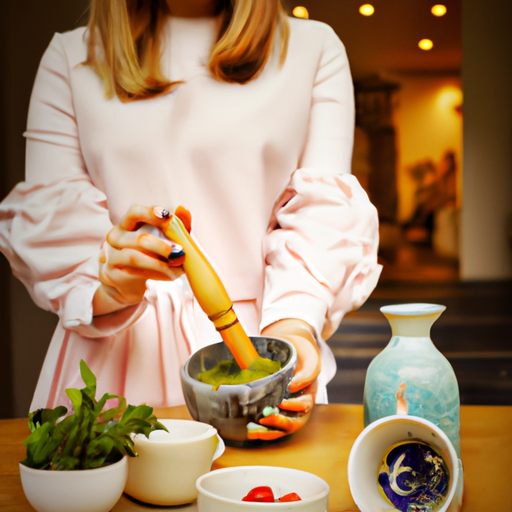
 Matcha Tea3 months ago
Matcha Tea3 months agoHow To Make Matcha Powder From Green Tea
-

 Turmeric Tea2 months ago
Turmeric Tea2 months agoHow Much Is 500 Mg Of Turmeric In Teaspoons?
-

 Turmeric Tea3 months ago
Turmeric Tea3 months agoBrewing the Perfect Cup of Turmeric Tea
-
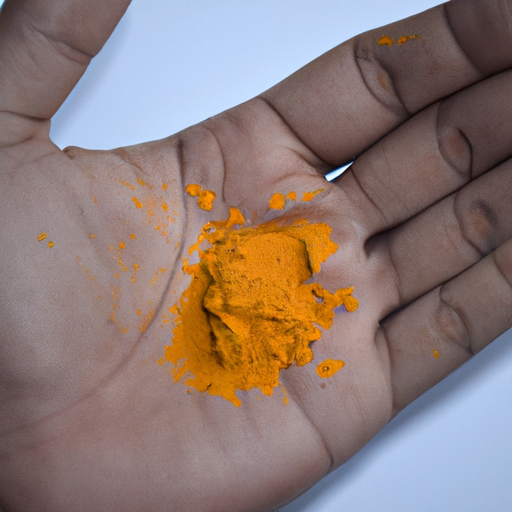
 Turmeric Tea2 months ago
Turmeric Tea2 months agoHow To Use Turmeric To Stop Periods








